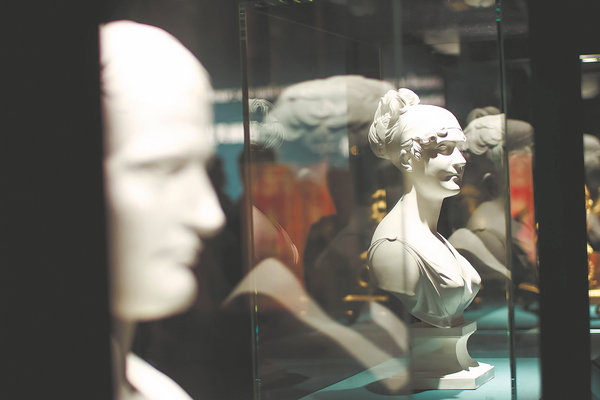

In September 1785, when the Ecole Militaire (Military School) in Paris released its exam results, only 58 of 137 students tested had passed, with a 16-year-old Corsican named Napoleon Bonaparte in 42nd place.
While academic performance is important, it clearly isn't everything. In Napoleon's case, few could have imagined that the young second lieutenant would later become a master tactician, statesman and emperor, reshaping not only France, but the European continent.
Today, Napoleon is a French icon, both revered and hotly debated, and "Le Petit Caporal", as he was affectionately nicknamed, is unarguably one of history's most prominent figures.
In 2021, France's Mobilier National mounted an exhibition marking the 200th anniversary of his death with fine pieces of decorative arts and crafts from its storerooms that exemplified Napoleon's political and private lives.
It has now come to Beijing. Meet Napoleon: The Disappeared Palaces runs until June 20 at the Meet You Museum in the bustling 798 Art District.
Organized by the China Arts and Entertainment Group, and a highlight of the yearlong celebration of the 60th anniversary of Sino-French diplomatic relations, the exhibition marks the Chinese debut of over 80 exquisite objects from the collections of the Mobilier National and the Fondation Napoleon in Paris.
They once decorated Napoleon's three palaces — the Tuileries, Saint-Cloud and Meudon, which were burned down between 1870 and 1871 during the turmoil of the Franco-Prussian War and the Paris Commune — and show Napoleon at his zenith, and the creativity of the time.
Photos and introductory texts allow visitors to navigate his victories and failures, on both the political and literal battlefields, and reveal a man who, while outstanding in military matters and a tireless worker, was also a voracious learner with an interest in many other fields, including law and mathematics. These are demonstrated by his introduction of the Napoleonic Code and a theorem which is attributed to him.
"He was interested in a wide range of things. He was curious and open to different ideas. He was gifted," Herve Lemoine, director of the Mobilier National, said at a forum following the exhibition's opening in Beijing on March 29.
He adds that the exhibition also shines a light upon Napoleon's lesser known patronage of the arts and sense of culture, vividly evidenced by the objects on show.